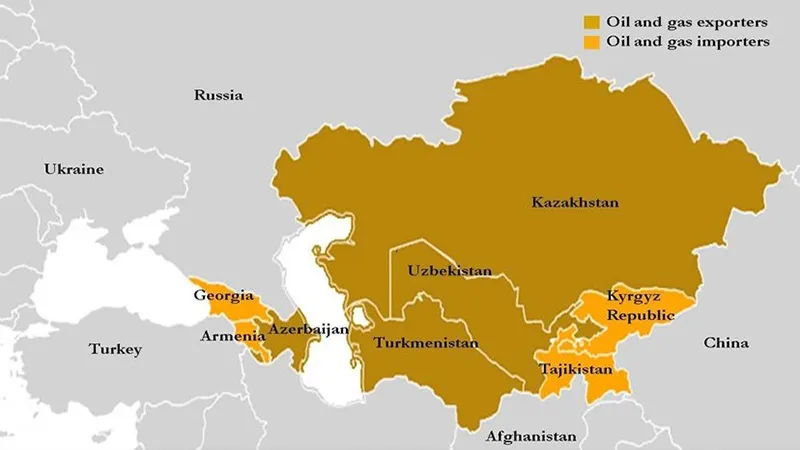For India, Central Asia has assumed significant priority, not merely as an extended neighbour with ancient civilisational links, but because of huge economic, security and energy advantages. For a long time, because of China's unchallenged geopolitical presence in Central Asia, further exacerbated by a lack of direct connectivity between India and Central Asia, the region remained low on India's foreign policy priorities. India's Connect Central Asia Policy that was unveiled by the then Minister of State for External Affairs E. Ahmed in 2012 too failed to provide any fresh momentum due to such inherent challenges.
PM Modi's visits to Central Asia and Iran, amid the beginning of India's accession to the Shanghai Cooperation Organization (SCO), underscore a paradigm shift in the India-Central Asia relationship.
However, recent developments have helped India to transcend some barriers in connecting with its extended neighbourhood. Prime Minister Modi's visits to Central Asia in 2015 and Iran in May 2016, amid the beginning of India's accession to the Shanghai Cooperation Organization (SCO), underscore a paradigm shift in the India-Central Asia relationship. While Modi's Central Asia visit attempted to explore new avenues of cooperation, his signing of the Chabahar agreement with Iran resurrected India's Connect Central Asia Policy by opening up new trade routes, bypassing Pakistan. Those agreements, besides providing India a gateway to landlocked Central Asian republics, have also offered these countries an access to warm waters via the port of Chabahar to maximise their economic gains. There is a chance now of breaking China's hegemony in Central Asia, particularly with respect to its energy harvest, which it has consolidated. This is visible through its pipeline diplomacy and energy stakes in this strategic landscape. The biggest of its energy adventures is the construction of new 1800 km gas pipeline connecting Turkmenistan and China through all the Central Asian countries. Operationalised in December 2009, this pipeline, just like the Baku-Tbilisi-Ceyhan pipeline, successfully broke Russian monopoly to an extent.
Besides reinvigorated strategic and economic ties with Central Asia, an enhanced bilateral equation with Iran and India's membership to the SCO will enhance India's energy security goals by diversifying its energy needs from West Asia. In this regard, India's active engagement to the SCO Energy Club, the Eurasian Economic Union and the "Asian Energy Strategy" (as proposed by Kazakhstan) could become a game changer. Notably, Central Asian states, namely Kazakhstan, Kyrgyzstan, Turkmenistan, Tajikistan, and Uzbekistan are rich in energy resources. According to the BP Statistical Review of World Energy 2016, Turkmenistan which leads the Central Asian Region (CAR) with the highest gas reserves is placed fourth in the world. Uzbekistan and Kazakhstan have the second and third highest gas reserves in this region. Kazakhstan also accounts for world's twelfth-largest global oil deposits. Tajikistan and Kyrgyzstan have abundant hydropower potential of which only less than 10% is being used.
India's SCO membership could now play a bigger role in ensuring greater energy cooperation between energy producers and consumers by linking Central Asia and South Asia.
Owing to the availability of rich energy resources in the region, the SCO mooted the idea of having an SCO Energy Club in 2006 to have deeper energy cooperation among the member states. However, the ineffective mechanism of such an energy cooperation with China as a dominant player in the Central Asian energy market meant that the club failed to take off. This was because China was not so interested in creating and developing a regional energy hub. Its focus was on extracting energy resources to satiate its own energy demand by aggressively acquiring oil and gas assets. India's SCO membership could now play a bigger role in ensuring greater energy cooperation between energy producers and consumers by linking Central Asia and South Asia, wherein Iran can be instrumental in facilitating the SCO Energy Club by becoming a major energy trading hub through the opening up of its Chabahar port.
This club would also enable a speedy implementation of a number of key energy and infrastructure projects in Central Asia and Iran, including the TAPI gas pipeline and the International North South Transport Corridor.
In addition this club can seek investments to boost their hydrocarbon and petrochemical sector in which India can play a significant role. To this extent Turkmenistan has already agreed to enhance the ambit of energy cooperation and to seek the expertise of Indian oil and gas PSUs in the fields of training, design, construction, exploration and production, during Modi's visit to Central Asia. Similar such investments should be encouraged across the entire energy value chain of this region so as to make the SCO Energy Club more versatile and effective.
Kazakhstan, the biggest oil and gas producer in Central Asia, also has advocated for an "Asian Energy Strategy" to adopt a comprehensive approach to energy security, with a greater thrust towards energy efficiency and environment protection. Integrating energy and climate goals, CAR can play a significant role in clean energy cooperation among its member countries and the region at large.
India's joining of the Eurasian Economic Union would offer added an advantage in helping India integrate to CIS states too. Russia is already seeking to include China, India and Iran to the Eurasian Union.
Thus, Central Asia, which has been a playground for a zero-sum game among several external actors, could find new ground for energy cooperation post India's SCO's membership, with overwhelming response from active regional players.
This commentary originally appeared in The Huffington Post.
The views expressed above belong to the author(s). ORF research and analyses now available on Telegram! Click here to access our curated content — blogs, longforms and interviews.




 PREV
PREV


